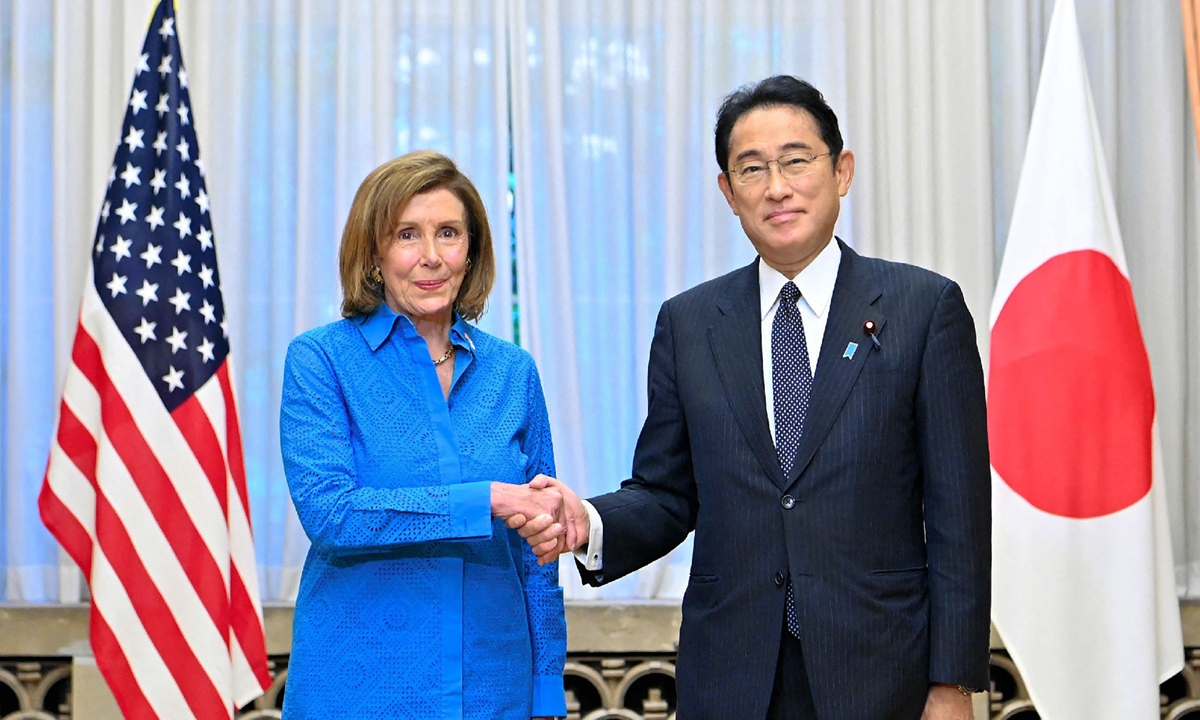
Japanese Prime Minister Fumio Kishida(right) meets with US House Speaker Nancy Pelosi on August 5, 2022. Photo: VCG
At a time of tensions in the Taiwan Straits after US House Speaker Nancy Pelosi's provocative visit to Taiwan island, Japan has not only failed to maintain regional stability, but instead issued erroneous statements on the Taiwan question. In this regard, observers warned there is a growing dangerous perception within the Japanese government that "a Taiwan emergency is an emergency for Japan."
With the Japanese government and society turning more and more conservative, observers condemned right-wing politicians for playing the "Taiwan card" and sensationalizing security concerns. They are trying to rationalize the country's goal of boosting the defense budget and amending its pacifist constitution.
Sanae Takaichi, policy chief of the Japanese ruling Liberal Democratic Party, who cited the deceased former Japanese prime minister Shinzo Abe's infamous remark "a Taiwan emergency is an emergency for Japan," tweeted on Friday that
China's military exercises around Taiwan island have made many people realize the emergency. She claimed that if tensions escalate, Japan will undoubtedly enter the "battlefield."
Takaichi is widely considered the successor to Abe's policies and she has often visited the Yasukuni Shrine which enshrines Japan's infamous Class-A war criminals who symbolized Japan's war atrocities and militarism during WWII.
Takaichi is using her tough rhetoric to make more political capital and win more support from conservatives in the hope that her situation would not be bad if she has to step down after Prime Minister Fumio Kishida's upcoming cabinet reshuffle, Da Zhigang, director of the Institute of Northeast Asian Studies at Heilongjiang Provincial Academy of Social Sciences, told the Global Times on Sunday.
If an emergency situation really happens in Japan, the Japanese government may not be able to protect the safety of its own people, Yasukatsu Matsushima, a scholar and political activist from Okinawa, told the Global Times on Saturday. "If the 'what happens to Taiwan' affects Okinawa, I don't think the Japanese government will protect the people here at all," he said, noting that anger is growing in Okinawa over the "risky" nature of Pelosi's provocation.
Okinawan political activist Yuzo Takayama told the Global Times on Saturday that 70 percent of the US military bases in Japan are located in Okinawa, and if the US military bases become targets due to its provocative actions, Okinawans will inevitably suffer great harm.
After Pelosi visited the island of Taiwan on Tuesday despite China's strong opposition,
Japan has taken a hard line on China - the country issued a joint statement with other G7 members on Wednesday that unjustly accused China over the Taiwan question, and Kishida met with Pelosi on Friday and criticized China's military drills around Taiwan island.
Also according to media reports, Kishida condemned on Friday China's drills around the island of Taiwan and claimed they were a "serious problem that impacts our national security and the safety of our citizens."
Another Japanese senior politician Taro Kono, head of the Liberal Democratic Party (LDP) Public Affairs Department and Japan's former foreign minister, on the same day claimed that the so-called "China's missiles landing in Japan's EEZ" was a serious issue that concerned Japan's national security.
On Thursday, Japan said that five missiles China launched during the live-fire drills "landed in Japan's EEZ." In response, Chinese Foreign Ministry spokesperson Hua Chunying said that China and Japan have not carried out maritime delimitation in relevant waters, so there is no such thing as China's military actions being held in or entering Japan's "EEZ."
The intention of the series of moves and remarks by Japan and its senior politicians is obvious, Da said.
The Japanese government is taking advantage of the Taiwan question to smear and demonize China and stir up the so-called China threat theory to lay a public opinion foundation for boosting defense spending and amending the pacifist constitution," Da pointed out.
There is no doubt that the China-Japan relations are facing another blow amid the Straits tensions, Da said.




